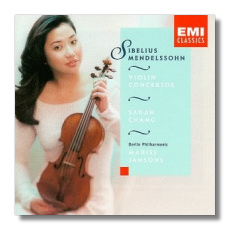
The Internet's Premier Classical Music Source
Related Links
- Latest Reviews
- More Reviews
-
By Composer
-
Collections
DVD & Blu-ray
Books
Concert Reviews
Articles/Interviews
Software
Audio
Search Amazon
Recommended Links
Site News
 CD Review
CD Review
Sarah Chang

Plays Violin Concertos
- Felix Mendelssohn: Violin Concerto in E minor, Op. 64 (1844)
- Jean Sibelius: Violin Concerto in D minor, Op. 47 (1905)
Sarah Chang, violin
Berlin Philharmonic Orchestra/Mariss Jansons
EMI Classics 5 56418 2 DDD 59:11 Live Recording
I waxed enthusiastic about Sarah Chang's recent recordings of the Paganini (#1) and Vieuxtemps (#5) concertos, praising her unadorned style and perfection of intonation and technique. Here, in a slightly unusual yoking of early and late Romantic masterworks, the challenges are quite different and her surmounting of the difficulties less convincing.
The Mendelssohn, with its flowing melodies and highly exposed solo part, requires better organizational skill on the part of the soloist to manage phrasing (from bar to bar) as well as integrating those notions with the orchestral part. Chang doesn't begin auspiciously: her tone upon entering is a bit diffident and "caught in the throat." Shortly after the opening, she is sharp as she reaches for some high notes. She sounds just behind the beat, as if waiting for direction from Jansons. I'm surprised the producer didn't just chalk these first few minutes up as a warm-up.
Chang doesn't do enough to enunciate the melodic contours of the concluding Allegro molto vivace. Both Milstein and Rosand, not to mention Heifetz (who makes the finale more of a thrill ride), develop the dipping and diving lines into a saucy conversation with the orchestra. Chang's utter ease with the part lends an air of complacency rather than aristocratic style. In the end, world-class competence is not enough to distinguish this recording in a host of great alternatives.
Sarah Chang's applies an unassailable technique to the Sibelius Concerto: instead of being merely facile, the momentum and sheer pressure that she generates provide much more interest. The Allegro, ma non tanto has a booming authority the Berliners are splendid, with Jansons asking for and receiving the controlled fury that the score demands.
This record possesses an extremely wide dynamic range. With Chang's violin at a comfortable listening level, the tuttis may startle you with their vehemence. Recommended for the Sibelius.
Copyright © 1998, Robert J. Sullivan


















